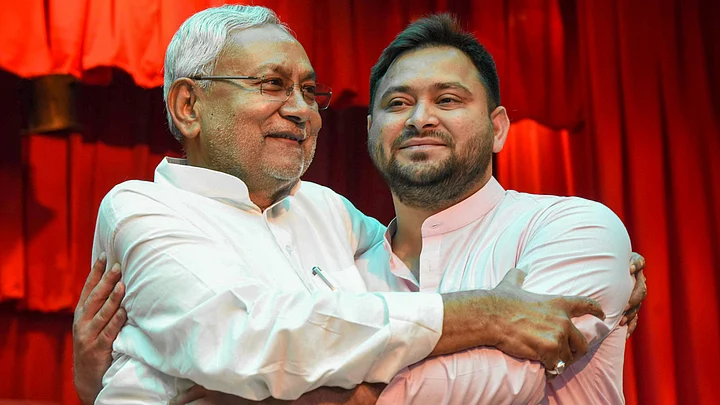Public opinion in Bihar seems divided regarding Chief Minister Nitish Kumar's recent political switch from the National Democratic Alliance to the Mahagathbandhan. A recent opinion poll conducted by survey agency PeoplePulse.Tech indicates a strong divide based on community and age group.
Out of the 1250 people surveyed by PeoplePulse.tech, 45 percent said that they approve of the change in government while 37 percent said that they disapprove of the change in government. According to the survey, 17 percent respondents had "no opinion" on the matter, while 1 percent did not want to answer.
In terms of voting preference for the 2024 Lok Sabha elections, the survey indicates a slight advantage for the Mahagathbandhan over the BJP.
Caste and Community Wise Differences
The survey indicates that support for the new Mahagathbandhan regime seems to be highest among Muslims, Yadavs, non-Paswan Dalits while opposition to it is highest among Upper Castes (except Bhumihars) and Paswan Dalits.
Surprisingly, Bhumihars, a traditionally BJP leaning community, seems more in support of the new government than against.
In terms of age group, support for the Mahagathbandhan regime is higher among younger voters, with 45 percent approving of the change in government against 38 percent disapproving of it.
However, support for Mahagathbandhan is slightly lower among women compared to men.
Among women, 43 percent approved of the change in government while 39 percent were opposed to it. Among men this was 46 percent and 37 percent respectively.
Voting Preference for 2024 Lok Sabha Elections
In terms of voting preference for the 2024 Lok Sabha elections, 36 percent respondents said they plan to vote for the BJP while the combined voting preference for the Mahagathbandhan was 47 percent (23 percent JD-U, 14 percent RJD and 10 percent Congress).
The survey hasn't factored in smaller parties like Mahagathbandhan allies CPI-ML, HAM(S), CPI and CPM as well as BJP ally Lok Janshakti Party. They have all been put under 'others'.
The Mahagathbandhan's lead, to a great extent, is being propelled by the youth. 51 percent younger voters said they plan to vote for the Mahagathbandhan, as opposed to 32 percent for BJP.
Among middle aged voters, BJP has a sizable lead, with 53 percent saying that the plan to vote for it as opposed to 33 percent for the Mahagathbandhan.
In terms of communities, the Mahagathbandhan has a lead among Muslims, Yadavs, non-Paswan Dalits and Kushwahas while the NDA has a clear lead among Rajputs and Paswan Dalits.
Here again the Mahagathbandhan has a smaller lead among women compared to men. Amomg women respondents, 41 percent said they plan to vote for the BJP as opposed to 44 percent for the Mahagathbandhan. Among men, 34 percent said they plan to vote for BJP as opposed to 49 percent for the Mahagathbandhan.
In the 2019 Lok Sabha elections, the NDA won 39 seats out of 40 in Bihar. At that time the JD-U was with the NDA.
Now with the JD-U switching sides and the Mahagathbandhan projected to be leading in terms of voting preference, the NDA may be in for sizable losses.
According to the latest survey by India Today and CVoter, the NDA could come down to 14 seats if the elections were held today, with the Mahagathbandhan at 26. This would mean a net loss of 25 seats for the NDA.
Obviously a lot could change from now till the elections, both in terms of political circumstances as well as alliances.
(At The Quint, we question everything. Play an active role in shaping our journalism by becoming a member today.)
